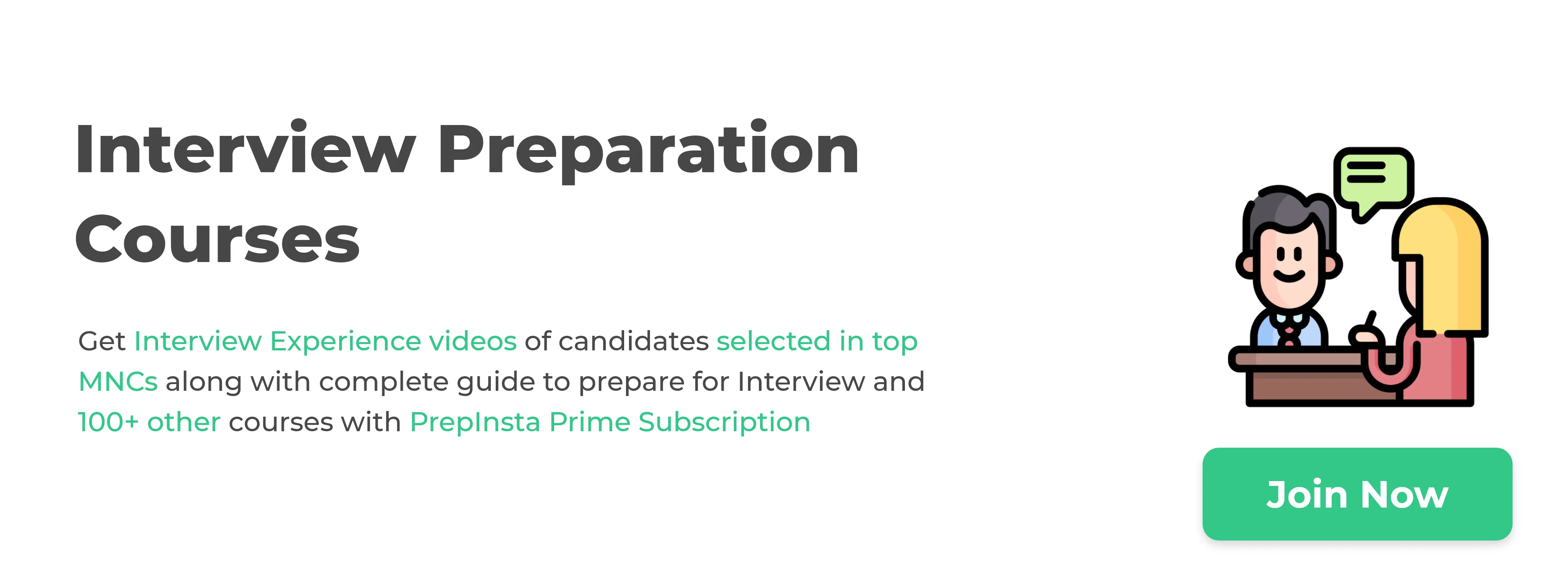Wipro WILP Menu
- Placement Papers
- Wipro WILP Aptitude Questions
- Wipro WILP Logical Reasoning
- Wipro WILP Verbal Questions
- Wipro WILP Syllabus
- Wipro WILP Aptitude Syllabus
- Wipro WILP Recruitment Process
- Wipro WILP Registration Process
- Wipro WILP Eligibility criteria
- Wipro WILP Technical interview Questions
- Wipro WILP Interview Questions
PREPINSTA PRIME
Wipro WILP Interview Questions
Wipro WILP Interview Questions for Freshers 2025
Here you will find all of the most recent Wipro WILP Interview Questions and Answers 2025. It will help you prepare for the Wipro WILP Interview round.
Page Highlights:-

Wipro WILP Interview Process
Wipro WILP Interviews are held for candidates with Bachelors in Computer Applications and Bachelor of Science. Wipro WILP has a two-tier interview structure. These are the two interview processes: –
- Technical Interview Round
- HR Interview Round
Wipro WILP Technical Interview Questions for BSc. Candidates
Question 1:- What is Python?
Answer:
Python is a general-purpose, high-level, interpreted programming language. Because it is a general-purpose language, it can be used to create almost any type of application with the appropriate tools and libraries. Python also supports objects, modules, threads, exception handling, and automatic memory management, which aid in the modeling of real-world problems and the development of applications to solve them.
Question 2:- What is Java?
Answer:
Java is a popular object-oriented programming language and software platform that powers billions of devices such as notebook computers, mobile devices, gaming consoles, medical devices, and many more. Java’s rules and syntax are based on the C and C++ programming languages.
Question 3:- How using Python programming language is advantageous?
Answer:
Advantages of Python Programming language:
- Python is a free and open-source programming language.
- It contributes to an increase in productivity.
- It’s a language that’s been translated.
- Python’s key advantage is that it is simple and straightforward to comprehend and learn.
Question 4:- What is PEP 8? Why is it important?
Answer:
PEP is an abbreviation for Python Enhancement Proposal. A PEP is an official design document that informs the Python community or describes a new feature or process for Python. PEP 8 is particularly significant because it documents the Python Code style guidelines. Contributing to the Python open-source community appears to necessitate a sincere and strict adherence to these style guidelines.
Question 5:- Define an Interpreted Language in Python?
Answer:
The statements in an Interpreted language are executed line by line. Python, Javascript, R, PHP, and Ruby are examples of interpretable languages. An interpreted language program executes directly from the source code, with no intermediate compilation step.
Question 6:- Define List and Tuples.
Answer:
List: The lists are changeable, which means they can be changed after they’ve been created. The function of the list is “dir(list)”.
Tuples: The tuples are immutable, which means they can’t be changed after they’ve been created. The function of the tuple is “dir(tuple)”.
Question 7:- Define abstraction in C++.
Answer:
Data abstraction is defined as delivering only important information to the outer world while masking background details, i.e., representing the required information in a program without showing the specifics.
Question 8:- Define Object-Oriented Programming.
Answer:
Object-Oriented Programming (OOPs) is a programming style that relies on object classes rather than just procedures and functions. Individual objects are classified. OOPs incorporates real-world entities such as inheritance, polymorphism, and hiding into programming. It also enables the linking of data and code.
Question 9:- List out some of the C compilers.
Answer
C programming is a very old programming language and has a wide range of compilers available in the market. They are available in multiple operating systems. Some of them are listed below
- AMPC
- CCS C Compiler
- ch
- clang
- Cygwin
- Digital mars
- GCC compiler
- MikroC Compiler
Question 10:- Define a class?
Answer
A class is nothing more than an object’s description. It’s a model, design, or prototype that describes the characteristics of a thing.
Wipro WILP HR Interview Questions
Question 1:- Tell me about yourself.
Answer:
Good day/afternoon. My name is _______, and I am a second-year B.Tech student at XYZ college. I am the current class representative and an active Rotaract Club member at our college. During my two years at college, I actively participated in various college events such as our annual college fest and intra-college sports meet, all while maintaining a CGPA of 8.5 until the third semester. I’m applying for this summer internship to gain professional experience and lay the groundwork for my future career.
Read more at: Tell me about yourself.
Question 2:- What are your strengths and weakness?
Answer:
I have exceptional writing abilities. I have strong attention to detail in my writing because I worked as a copy editor for five years. I’ve also written for a number of publications, so I understand how to adapt my writing style to the task and audience. As a marketing assistant, I will be able to efficiently write and edit press releases and update web content.
Read more at: What are your strengths and weakness?
Question 3:- Can you work under pressure?
Answer:
Working under pressure is advantageous because it allows me to be more effective and complete my tasks on time, whereas too much pressure can have a negative impact on someone’s psychological well-being, potentially reducing performance and leading to stress. Under reasonable pressure, I believe I will feel more at ease and more productive.
Read more at: Can you work under pressure?
Question 4:- How do you feel about working weekends and night shifts?
Answer:
Anything that is required for the company’s growth and success will also lead to my growth. So if working in rotational shifts/night shifts is required, I am completely fine with it.
Read more at: How do you feel about working weekends and night shifts?
Question 5:- How quickly do you adapt to new technology?
Answer:
I’m fairly tech-savvy. I can quickly adapt to new situations and am always mentally prepared to face challenges. Taking on challenges, in my opinion, helps an individual learn quickly and grow in their career as well as in life. During college, I had to complete papers and projects every semester and thoroughly enjoyed doing so. Taking such challenges in college gave me the confidence to apply them in my professional life as well.
Read more at: How quickly do you adapt to new technology?
Also Check:-
Wipro WILP Technical Interview Questions for BCA Candidates
Question 1:- Why is C classified as a middle-level language?
Answer
A middle-level language is one that bridges the gap between machine and high-level languages. One of these programming languages is C. It has applications in both system and application programming (for example, in operating systems) (like as spreadsheet). Machine and human language are more closely related at the middle level. That is why it is referred to as a “middle-level language.”
Question 2:- What are the main characteristics of OOPs?
Answer:
- Inheritance
- Encapsulation
- Polymorphism
- Data Abstraction
Question 3:-What is the definition of inheritance?
Answer:
OOPs has a feature called inheritance, which is defined as the mechanism by which one class takes on the characteristics and methods of another class. The Parent class is the class from which the attributes and functions are inherited.
For Eg: The properties of a Class Vehicle are inherited by Class Bus, Class Car, and Class Truck. The most crucial feature of inheritance is that it allows for code reuse.
Question 4:- Define a reference in C++?
Answer:
A reference functions similarly to a pointer. It’s just another name for a variable that already exists. Once a variable is initialized with a reference name, the variable can be accessed using either the variable name or the reference name.
Question 5:- What exactly are you referring to when you say "process"?
Answer:
The term “process” refers to a program that is running. Processes can be divided into two groups:
- Processes of an Operating System
- Processes by Users
Question 6:- What are the stages of the SDLC?
Answer:
SDLC’s general phases are as follows:
- Gathering Requirements
- Analyze the System
- Design
- Coding
- Testing
- Implementation.
The phases are determined by the software development model we adopt.
Question 7:- Write the program to find the Fibonacci series up to the nth term.
Question 8:- What are the benefits of a database management system (DBMS)?
Answer:
- Controlling redundancy
- Unauthorized access is restricted.
- Multiple user interfaces are available.
- Backup and recovery services are available.
- Integrity limitations are enforced.
- Ensure that data is consistent.
- Easily accessible
- Due to the usage of queries, data extraction and processing are simple.

 Apply For Jobs
Apply For Jobs Get Hiring Updates
Get Hiring Updates


Login/Signup to comment